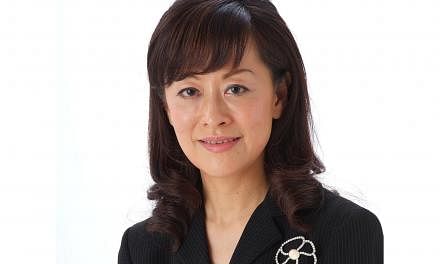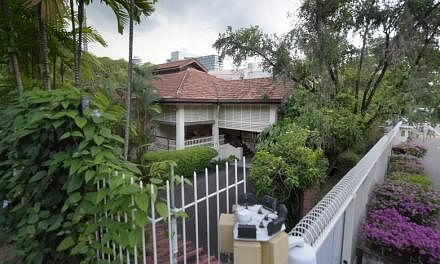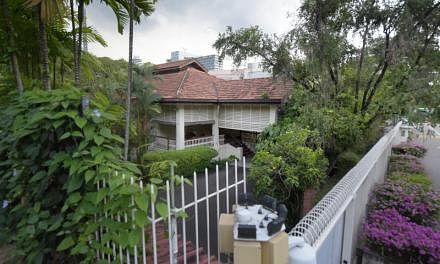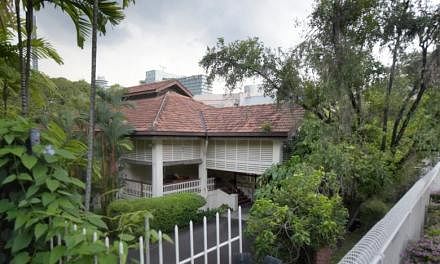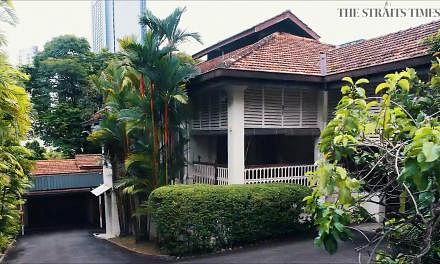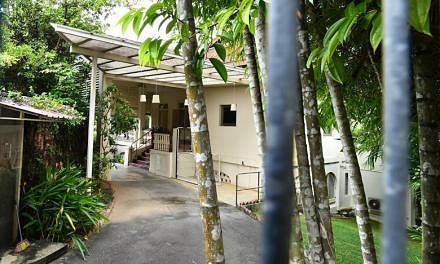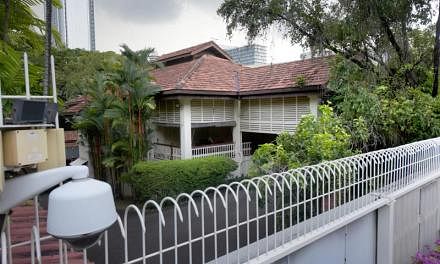To my surprise, the most pressing question raised in yesterday's debate on Oxley Road had nothing to do with whether to demolish or preserve the house that Mr Lee Kuan Yew lived in.
It wasn't even the question of whether there was abuse of power by his elder son, Prime Minister Lee Hsien Loong, as alleged by his other children Hsien Yang and Wei Ling.
Instead, it was the question of whether Parliament was even the proper, or best, forum to address the issues surrounding 38, Oxley Road. The controversy erupted when the two younger Lee siblings posted a series of notes on Facebook beginning June 14 that, among other things, accused PM Lee of misuse of power, voiced fears that organs of state could be used against them, and suggested that Ms Ho Ching, the wife of PM Lee, had a pervasive influence in the civil service far beyond that of her appointment as chief of state investment agency Temasek Holdings. The siblings had fallen out over what to do with their late father's house.
PM Lee later decided to convene a parliamentary hearing to have a "robust" debate on the issues. At the sitting yesterday, PM Lee, and members of a ministerial committee set up to consider options for the house, responded to some of those allegations.
But some MPs said Parliament was not the right forum as the accusers did not have a chance to appear to present their case. Some Singaporeans have also said it was a waste of public resources to debate a family dispute.
A few MPs yesterday called for Parliament to convene a special select committee to hear the issues. Among them were Nominated MPs Kok Heng Leun and Kuik Shiao-Yin and Workers' Party MP Pritam Singh.
Mr Singh noted that such a committee would have powers to summon witnesses, and powers to fine or imprison witnesses for contempt of Parliament if they lied. It can also call for documents and records. Hearings may be closed-door or public.
Such a select committee would address the allegations of abuse of power which have to be decisively addressed, said Mr Singh. "Otherwise an odour will linger, one that will have severe and significant repercussions for Singapore's reputation."
But as Senior Minister of State Janil Puthucheary countered, a select committee is still an organ of Parliament, so those who call for a select committee hearing cannot in the same breath criticise Parliament as being the wrong forum to address such allegations.
In any case, he said, having a parliamentary sitting this week, two weeks after the allegations surfaced, did not preclude other hearings taking place which may take longer to convene.
He also noted that select committee hearings would have to probe specific allegations. But in this case, "there are no specifics, there is no evidence, there is no substance to the allegations".
He said: "It was of great interest that no one has been able to substantiate anything in this House. If you're going to have a select committee you need to have some reason to have the select committee as opposed to just (say) I wasn't able to do my job properly."
I agree with Dr Janil's fundamental argument. If we believe in parliamentary democracy, and in the solemn duty of elected legislators' roles as a check on the executive, then Parliament is the right and proper forum to scrutinise allegations of corruption.
If the charges had been more specific, a commission of inquiry or a select committee might be the sensible option. But in this case, all we hear are broad, sweeping allegations about abuse of power. Bringing them up to the legislature to examine is the sensible recourse.
As Ms Kuik notes, accusations of "Orwellian threat of state intimidation and monitoring of private citizens; and the supposed nepotism behind key appointments in the public service" have some traction because the Government continues to be viewed as "opaque in its decision-making and arrogant or defensive in its communication".
The antidote to this is more transparency. In this regard, I think PM Lee's decisions to recuse himself from the committee set up to explore options for the house, and to subject himself and his actions to full parliamentary scrutiny, speak of his personal integrity.
Apart from Parliament, another forum for addressing allegations of abuse is the court.
WP chief Low Thia Khiang told PM Lee to settle the case privately with his siblings or in court. He chided them for continuing with a "Facebook brawl" that was damaging to the country's reputation.
"The Government should not continue with this dispute in the public domain. Good government cannot be achieved in social media. The PM is faced with serious allegations from his brother and sister. These allegations need to be addressed in a proper manner."
Reminding PM Lee that it was the People's Action Party's practice to sue those who alleged corruption or wrongdoing, he continued: "End this saga now. I am of the view that the correct platform to settle the private dispute is the court. Individuals who make less serious allegations that undermine the reputation and authority of the PM and Cabinet ministers have been brought to task for libel. There's no reason why this time it should be different because it comes from the Lee family."
In his ministerial statement, PM Lee had explained that he chose not to sue his own siblings for defamation as doing so would "further besmirch my parents' names" and cause "more distraction and distress" to the public.
In Asian, family-loving Singapore, many Singaporeans understand the reluctance to sue family members in court.
And as Dr Janil alluded to, a court case would drag out this sorry saga even longer. He also pointed out that Parliament cannot compel a private individual to sue his brother.
At the same time, however, it is clear that the allegations against PM Lee centre not only on himself but involve his Government and ministers. It is not only PM Lee's reputation, but that of the Government, that is being dragged through the mud. Hence, any decision to launch a lawsuit to protect its reputation might have to be done by the Government.
This would cause the ruling party damage. It would take up precious time and resources at a time when the country has many pressing demands.
Ironically, however, letting his own siblings get off with alleging nepotism and abuse of power without taking the usual legal course of action merely lends an aura of credibility to the very things he is being accused of: that family members of powerful people like the Prime Minister get an easy pass.
PM Lee and his team are caught between a rock and a hard place.
Meanwhile, Singaporeans will be hoping that more light will be shed today, on the second day of debate on the allegations. This can only happen if MPs play the role of inquisitor and probe government ministers. As the old cliche says, sunlight is the best disinfectant. The best antidote to the odour of suspicion is to open the windows wide and let the fresh air of facts in.


